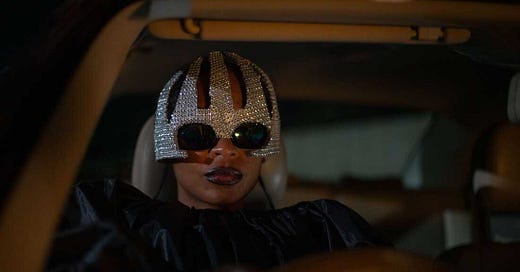On Becoming a Guinea Fowl (Rungano Nyoni, 2024)
It took me a while to get on the wavelength of Rungano Nyoni’s sophomore feature, On Becoming a Guinea Fowl. Going in relatively blind, I sat down expecting an austere art film, one that played with the line between narrative and documentary, perhaps an international co-production with non-professional actors. This response speaks as much to my preconceived notions regarding films from the Global South as to the sparsely-populated lane Guinea Fowl operates in, namely, the tonally sophisticated political satire.
On Becoming a Guinea Fowl concerns a young woman’s fraught relationship with Zambian tradition. Driving home one night in a spectacular rhinestoned headpiece, Shula, comes upon the body of her uncle Fred outside of a local brothel. Caught in a whirlwind of mourning rituals, Shula, who has since moved to the United Kingdom for work, bristles against the patriarchal nature of the proceedings, which requires dramatic expressions of grief and place women in positions of servitude. To make matters worse, Fred was a serial sexual abuser, a man who regularly preyed on the young women in the family, Shula included. Watching with a mixture of confusion and horror, Shula observes the way these rituals are structured to protect patriarchal dominance, as Fred’s misconduct is either swept under the rug or blamed on the women in his life.
Guinea Fowl displays impressive tonal dexterity, fluidly shifting between comedy and horror, naturalism and surrealism. This is on full display in the opening sequence, where the mysterious presence of a younger Shula staring at Fred’s body transitions into a drunken phone call with Shula’s father, and eventually a scene of Shula, forced to spend the night in her car, listening to an American podcast about healthmaxxing (the brief comedic depictions of the West productively expand the film’s critique). A predominantly nocturnal film, Nyoni’s deft manipulation of space often has characters appearing out of nowhere, occasionally giving the film a ghostly, investigative quality. This formal wit is enabled by Nyoni’s vivid characterizations, lived-in and expressive enough to accommodate the film’s tonal modulations.
If On Becoming a Guinea Fowl gradually loses steam, it’s because those beguiling tonal modulations eventually settle into something more conventionally leaden. An increasing reliance on the unproductive titular metaphor is indicative of the film’s transformation. As Shula takes on the qualities of a guinea fowl, a bird whose cry warns surrounding animals of predators, Nyoni concretizes her film as one about the difficult roles women (and the film itself) are forced to embody to fight the system.
On Becoming a Guinea Fowl is distributed by A24 and is in theaters now.




